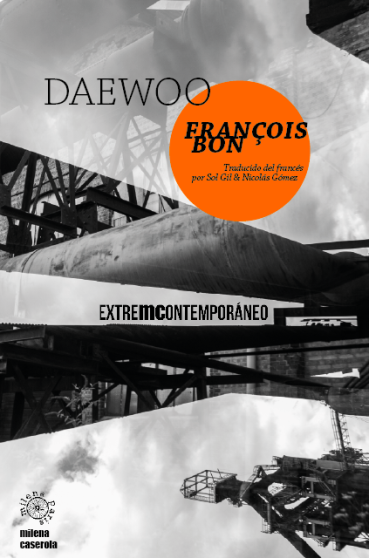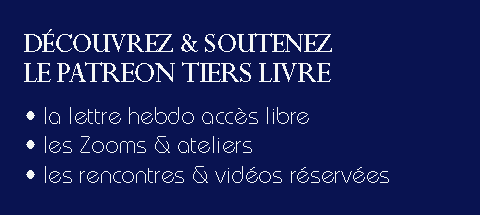
Daewoo paru en Argentine, et le prix French Voices à son éditeur et traductrice US, l’occasion d’en reparler
• Mais bonne nouvelle transmise il y a quelques jours sur mon Facebook, l’attribution du prix French Voices 2016 à l’éditeur de la Nouvelle-Orleans, Bill Lanvender, Lavender Ink / Dialogos, et à la traductrice Youna Kwak (poète elle-même, et j’aimerais tant lui rendre la pareille...) pour le livre à paraître début 2019. Raison de plus de mettre en ligne et échange.
About Daewoo as a novel – interview with Milena Heinrich
1) At the beginning of the book explain why to call "Daewoo" as a novel and say that it is the attempt to reconstruct an experience. How did the reconstruction of this experience operate from the literary point of view ? Does that element imply a certain degree of fiction ? Why argue that it is a novel ? And more specifically : how did "Daewoo" come about ?
It’s a novel because it’s essentially built at my table, with a computer and an Internet access. I don’t use categories as fiction or non-fiction : writing is an experience by itself, and its main stuff is what we do with it in our own brain. The chosen form, a diary and interviews, are both fictional, used because they create a strong illusion of reality.
2) It says that "if the workers no longer have their place anywhere, let the novel be memory." How do you think literature and memory are articulated ? Does literature have the power to officiate or guarantee memory ? Does it give you some kind of role in that regard ?
Sure, in all ages, the function of narratives and stories deal with memory, and arts of the memory. But the task of the writer stays subjective. We don’t choose what has to join into, or stay in the collective memory. Just do our own job, which is to obey. The law is the reality, and the law is the syntax and composition.
3) The novel is published in Argentina twelve years after its publication in France. In the light of the passing of time, what does it represent in Daewoo ?
No idea about that. This book has been written as a live inquiry. But the status of the work (as a concept) remains strongly and permanently as an issue in our society, a permanent look from the society on or about itself. We are dealing today about a society without work, this is somewhat new, but a new face of the same old question. Factories closed or deserted, or simply demolished, are a permanent and sad event nowadays too.
4) We speak of novel but "Daewoo" also seems a chronicle on capitalism, the consequences of the economic order, the emotions (the anguish of those workers), the work, the working class... And it can also be read as an ethnography that recovers the voice and gestures of its protagonists and tries to disarm a collective history to tell it as a kaleidoscope. I wonder then motivated by the reading of the book : what is a testimony ? What is a testimony ?
I don’t pretend to any testimony. My work is to deal with reality. Which is a concept of high complexity and a plurality of dimensions. What concerns money, power games, economic flows, territorial policies are some of these dimensions. Which are partly abstract and invisible too. Balzac and Karl Marx have educated us in this way. The field of literature can’t be reduced to nice stories between nice fellows.
5) If we think of it as an ethnography, in which the researcher implies his field, "Daewoo" is the expression of a researcher who is involved with his subjects of study. What does Daewoo mean to you ? (I think of some passages of the narrator that talk about their own feelings of anguish / sadness). And in this case, does Bon narrator dissociates with the more personal Bon, who was there listening and collecting the words of those women ?
That the narrator is a part of his narrative, we learn that primarily by Marcel Proust. The narrator, as the writing of the inquiry itself, is obviously one of the gearwheels in the novel mechanism. Other questions are old moons. In the first beginning, it’s not a planned book : this social drama, the sacrifice of a modern and viable factory, established in a valley dominated by the ruins of steel industry, was incredibly documented. This is a new fact : how the reality produces it own documentation, it hasn’t ceased to increase these last years. Literature, as a gesture, doesn’t have to invent this documentation, but to knock it over, to find again a little germ of the oldest human story. We had first decided to produce a theater performance, a truck, some benches, and to play it with four actresses in this valley itself. To play the existing facts, statements, words taken from this compact and massive documentation during the original struggle of these women. My first file in my computer has been made of my own notes about this performance in progress (which we have done, with Charles Tordjman as director, at Avignon festival, and a large tour, obtaining a Moliere prize). The most difficult event has been the day, before the coffee machine of the Nancy’s dramatic center, when I told Charles : “These notes are a book by themselves, I’ve to handle them as a story.” I refused all this time to produce the text of the play by itself : the play is included in the book as an echo. Fictional interview of a character is a classical tool if you need an actor to talk right or acurate. In another field, some pure datas may appear as a specific field for imaginary. Another very disturbing fact came at the publication, once confronted to the real persons, which has been out of reach for us before : when you hear real stories that are already in your book, but you didn’t know them.
(6) It is a fragmented book, made up of pieces, with different genres. How did you think the structure of the novel ? Does it respond to an attempt to renew literary genres ?
Nothing new here. A symphonic and fragmental composition, there are dozens of books, Proust included, to show us the way. Henri Michaux for exemple (which has often traveled in Argentina, and met Borges in 1935, both of them perfectly unknown). The use of the dialogue comes mostly from Nathalie Sarraute. But, in a totally different sense, what we’ve learned about narrative is that the story is firstly the story of the narrative by itself. The linear composition is directly my own path to take a grip on a fragment of a very complex, even if limited, and ephemeral reality. The main question in this book has been what deals with time and temporality. For example, during two years (even if it’s a permanent tentation), the use of violence to answer another violence. Destroying your working tools, confining your boss. Another question is the change of the society by itself. Internet was at his beginning when I achieved this work, it was so easy to hack a lot of archives. What relies work to other components of the society : education, police, illicit economy ? How a society deals with suicidal (the suicidal recalled in the book has a real source), or depression caused by a decision taken at the other end of the world, only due to financial approach. What signification takes the end of a factory when the use of it productions remains with a dimension of desire (television set) or utility (microwave owen) ? What does it mean for a young woman alone with his child, to find a new job as dog cleaner ?
7) In reference to the previous question, and at the risk of sounding excessively broad, what is literature for you ? What do you think about when you think of literature ?
Literature, for me, as the simplest view, is language as reflection. Maurice Blanchot learned us that way. It’s not about what you think. It’s about how you sing and dance in the fire of reality. Daewoo has been my first book written essentially wit Internet tools. If I learned something for this book, which has been, with the enquiry and the theater adventure, a very tough period of my life, it’s how you permanently have to walk through the real, face it, make words and sentences whose the unique law is this reality. The experience of web literature, which is my main path today, takes his roots in what this book changed for me then.
diffusion sous licence Creative Commons CC-BY-SA
1ère mise en ligne et dernière modification le 28 février 2017
merci aux 2585 visiteurs qui ont consacré 1 minute au moins à cette page

